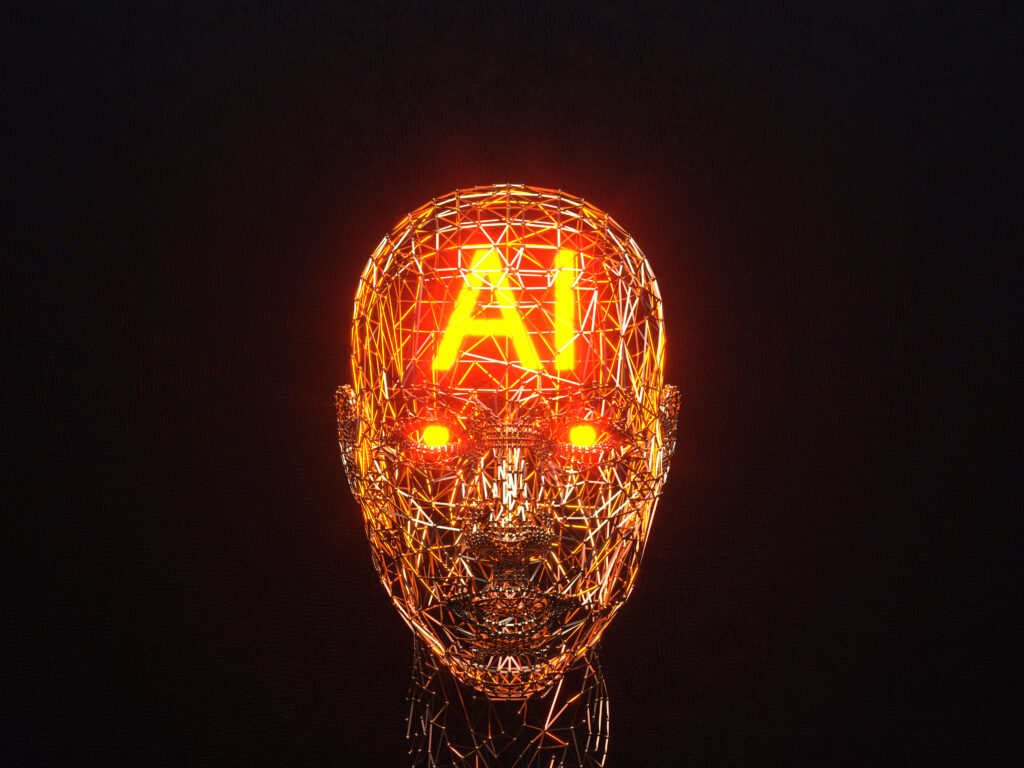Table of Contents
INTRODUCTION

Right now we are in the era of AI and the use of AI in the future will increase rapidly so why don’t we use this in the energy sector for the creation of clean energy there are many ways by which we can create energy with the help of AI and we can also save energy with the help of AI.
when we use AI in the energy sector it will get revolutionized and the wastage of energy also decrease and efficiency increase.
Future of AI in the Energy Sector

AI has the potential to change the energy sector completely, we can use ai in almost every aspect of the energy sector from the generation of energy to the distribution of it.
Artificial intelligence in energy and utilities
1# Improve the management and increase efficiency– ai has the potential to manage a large amount of data at the same time which can help us to improve management if the management Improves the wastage of energy also decreases and the efficiency will automatically increase.
2# Renewable Energy Integration-Right now there are many sources of renewable energy but they all work separately, with the help of AI we can integrate them and can able of get maximum output, the example we can integrate solar and wind energy, with the help of AI we can find the perfect place for solar and wind plant and ensure of maximization of the grid.
3# Smart Grids and Energy Distribution- Man-made intelligence innovations can empower the improvement of brilliant matrices that can progressively adjust energy market interest. Computer-based intelligence calculations can enhance energy appropriation, distinguish shortcomings or peculiarities, and reroute energy streams to limit disturbances. This upgrades the framework’s unwavering quality, empowers better burden on the executives, and supports the coordination of disseminated energy assets.
4# Prescient Support-simulated intelligence can empower the prescient upkeep of energy foundation by breaking down sensor information, recognizing examples of gear disappointment, and foreseeing upkeep necessities. This proactive methodology can decrease personal time, expand gear life expectancy, and advance upkeep plans, prompting cost reserve funds and expanded functional productivity.
5# Energy Capacity Streamlining: simulated intelligence calculations can advance energy stockpiling frameworks by foreseeing energy interest, improving charging and releasing cycles, and boosting the use of capacity resources. This helps balance the discontinuous idea of environmentally friendly power sources, further develop network solidness, and diminish dependence on petroleum product-based reinforcement power.
6# Energy Exchanging and Markets: computer-based intelligence can change energy exchanging and showcases overwhelming information, including supply-request elements, market costs, weather conditions gauges, and international variables. Computer-based intelligence-controlled exchanging calculations can robotize navigation, enhance energy-exchanging methodologies, and further develop market productivity.
7# Demand Response and Energy Consumption-simulated intelligence can empower request reaction programs by investigating energy utilization designs, client inclinations, and ongoing information. Man-made intelligence calculations can help boost customers to change their energy use during top interest periods, decreasing stress on the framework and empowering more effective energy dissemination.
8# Environmental Monitoring and Sustainability-Computer-based intelligence can assume a vital part in nature observing and manageability endeavors. By investigating satellite symbolism, sensor information, and environment models, man-made intelligence can assist with recognizing natural dangers, enhancing land use for sustainable power establishments, and backing preservation endeavors.
It’s critical to take note that while artificial intelligence offers colossal potential in the energy area, there are additional difficulties to address, for example, information security, protection concerns, moral contemplations, and the requirement for administrative structures. In any case, the combination of man-made intelligence advancements holds an extraordinary commitment to reforming the energy area, further developing productivity, lessening costs, and working with the change to a cleaner and more economical energy future.
AI energy consumption

When we talk about the energy needed to operate AI algorithms and models, encompassing both the training and inference stages, we are largely referring to the energy consumption of these processes. AI systems’ energy consumption varies based on several variables, including:
1-Hardware: The hardware required to run AI algorithms has an impact on energy usage. Deep learning models are frequently trained using GPUs (Graphics Processing Units), which can be power-intensive. To increase energy efficiency, however, more modern hardware and specialized AI processors are being developed
2 –Model Complexity: AI models’ size and complexity have an impact on the amount of processing and energy they require. Larger models with more parameters often need more processing power, training, and inference time.
3-Optimization Techniques: AI researchers and engineers continually develop optimization techniques to reduce the energy consumption of AI algorithms. These techniques aim to streamline computations, minimize unnecessary operations, and improve hardware utilization.
4- Optimization Techniques AI researchers and engineers are constantly creating optimization methods to lessen the energy requirements of AI algorithms. These methods seek to simplify computations, reduce pointless processes, and maximize hardware efficiency.
It is important to note that although developing AI models can consume a significant amount of energy, the potential advantages of using AI to optimize energy use across multiple industries may exceed this. The entire effect can result in considerable energy savings and a more sustainable energy future by employing AI to optimize energy management, improve efficiency, and enable the integration of renewable energy sources.
The goal of ongoing research and development is to make AI algorithms, hardware, and deployment tactics more energy-efficient to reduce their energy consumption and maximize their benefits in energy optimization and management
AI energy companies

Several companies specialize in the application of AI technologies in the energy sector. Here are a few notable examples.
1-DeepMind: DeepMind, a division of Alphabet Inc., the parent company of Google, has been heavily engaged in applying AI to optimize energy use. To increase energy efficiency, they have worked with energy firms to build AI algorithms for data center cooling systems.
2–C3.ai: C3.ai provides an AI software platform created especially for the energy sector. With the help of their platform, utilities, oil and gas firms, and producers of renewable energy can use AI for a variety of tasks, including demand forecasting, asset optimization, and predictive maintenance.
3–AutoGrid: AutoGrid offers a platform for AI-driven flexibility management in the energy sector. Their platform assists utilities and energy service providers with resource optimization, distributed energy asset management, and demand response program facilitation
4–SparkCognition: With a focus on proactive maintenance, asset optimization, and cybersecurity, SparkCognition creates AI solutions for the energy industry. Their AI technology aids energy firms in increasing operational effectiveness, cutting costs, and improving reliability.
5-Siemens: Siemens is an international technology business that applies AI to the energy industry. They use artificial intelligence (AI) technology to improve energy management, grid optimization, and grid integration of renewable energy sources.
6-General Electric (GE) Power: To improve energy efficiency, grid management, and asset performance in power generation and distribution, GE Power integrates AI into its solutions. They optimize operations and maintenance procedures with software and analytics powered by AI.
These are just a few instances of companies that are actively utilizing AI in the energy sector. The topic is quickly developing, and numerous firms and academic organizations are investigating the use of AI in industries like energy trading, grid optimization, and renewable energy integration.
AI in solar energy

The design, optimization, monitoring, and maintenance of solar energy systems are just a few of the areas where artificial intelligence (AI) holds great promise. Here are some significant applications of energy and ai impact factors in the solar energy industry:
1-Solar Panel Optimization-AI algorithms can examine elements including geographic location, weather, shade, and building structures to determine the best size and orientation for solar panels. This increases a site’s ability to generate as much solar energy as possible.
2-Solar energy forecasting: To predict solar energy generation with accuracy, AI models can examine past weather information, satellite images, and current weather data. To better balance supply and demand and integrate with other energy sources, this information is essential for grid integration and energy management.
3-Fault Detection & Performance Monitoring: AI is capable of monitoring the efficiency of solar panels and identifying any irregularities or problems in real time. AI algorithms can discover underperforming panels, shading problems, or future system breakdowns by evaluating data from sensors, weather conditions, and historical patterns. This enables quick maintenance and optimization.
4-Operations and Maintenance: AI can make solar power plant maintenance schedules more efficient. AI algorithms can forecast maintenance requirements, schedule maintenance tasks, and improve plant performance by examining previous performance data, weather trends, and maintenance records. This decreases downtime, boosts overall system effectiveness, and increases equipment lifespan.
5-Energy Management and Grid Integration: To maximize the integration of solar energy into the grid, AI algorithms can examine data on solar energy generation in conjunction with grid conditions, energy demand, and electricity market dynamics. This includes figuring out when energy storage, load balancing, and grid stability management should take place.
6-Energy Trading and Financing: By examining solar energy production and market conditions to optimize trading tactics, AI can enhance energy trading platforms and marketplaces. AI can also help with risk analysis, financial modeling, and project feasibility assessments for solar energy investments.
7-Virtual Power Plants (VPPs)-AI can make it easier to combine and optimize various distributed solar energy systems inside virtual power plants (VPPs). By utilizing AI algorithms, VPPs can more efficiently engage in the energy markets and optimize energy generation, storage, and delivery.
AI in the renewable energy sector has infinite potential because both AI and renewable are the future
Artificial intelligence (AI) technology integration in solar energy has the potential to improve grid integration, lower maintenance costs, and increase system efficiency. The goal of ongoing research and development in this field is to improve data quality, advance AI algorithms, and enable seamless interaction with other renewable energy sources and storage systems.
FAQ
How AI can help in energy?
By increasing effectiveness, lowering costs, and facilitating the integration of renewable energy sources, AI can optimize energy systems and operations., it can also improve energy forecasting, demand response, and grid management.
How will AI affect the energy industry?
By strengthening grid stability, facilitating the integration of renewable energy sources, and optimizing energy management through sophisticated analytics, preventive maintenance, and intelligent decision-making, AI will change the energy sector.
How can AI solve energy problems?
A more sustainable and dependable energy system can be achieved by using AI to optimize energy consumption, increase energy efficiency, enable the integration of renewable energy sources, improve grid management, and enhance predictive maintenance.
What is the role of AI in renewable energy management?
To create a more effective and sustainable renewable energy system, AI is used to manage renewable energy sources by optimizing their integration, forecasting, and operation. This is done by analyzing data, increasing efficiency, enabling better energy storage management, and enhancing grid stability.

